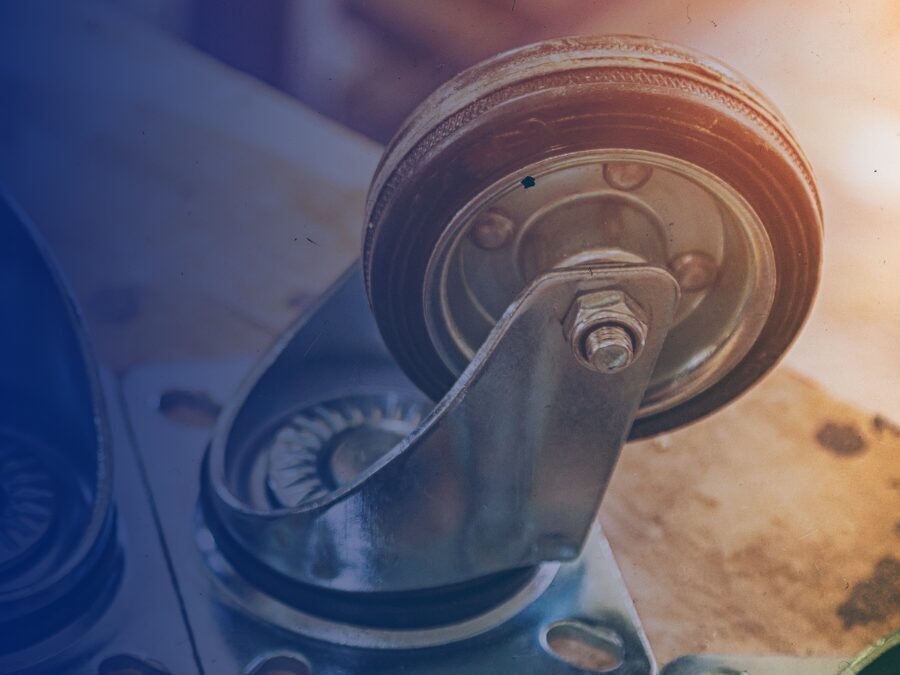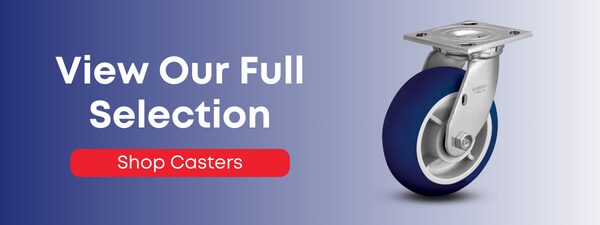When deciding the best types of casters for your unique application, there are several important factors to consider. Today, we’re discussing the most important factors to help you narrow down your caster search.
With 80+ years of expertise behind us, C.P. Lauman is your go-to caster distributor. Our mission is to help keep your business rolling through product knowledge, expert advice, and resources.
How to Choose the Best Types of Casters: Size & Rollability
Choosing the best types of casters comes down to understanding the size/ diameter you’ll require for your application. Will you be requiring large wheels or small wheels? Remember, larger wheels distribute weight more evenly, and provide easier rollability than smaller wheels.
Another factor to consider along with the diameter of your caster, is the ease of roll. The right ergonomics can make all the difference if you’re pushing your loads manually. The type of bearings and mounting your caster determines its ergonomics and rollability. All of our featured caster brands offer a variety of casters with precision ball bearings, for maximum rolling ease and quiet operation with a maintenance-free ride.
Next, determine how you’ll be rolling your loads. Your rigid casters will only roll forward and backward. Whereas your swivel casters rotate 360°, giving you the ability to change direction quickly. Once you narrow down how you’ll be utilizing your casters, ask yourself the next few questions.
Caster Wheel Material: Decide the Type That You’ll Need
As you continue narrowing down your search for the best types of casters, you’ll need to choose your desired caster wheel materials. Our C.P. Lauman sales team will guide you in the right direction, but here are a few things to consider first.
- What kind of floor surfaces will your caster wheels be used on?
- Are you planning on rolling over debris or liquid?
- Will you be rolling over soft or hard surfaces?
Softer wheels will roll more efficiently over hard surfaces like tile, hardwood, and laminate. On the other hand, hard wheels require less force to roll on soft surfaces like carpets. Consider a caster wheel with soft, Performa Rubber material, which offers exceptional cushion when rolling over debris. Several casters from the Colson brand are available with Performa rubber wheels offering various swivel and rigid top plate options.
Now, that you have decided how you’ll be using your casters, let’s discuss capacity.
Understanding Your Caster Load Capacities
Before deciding on the exact wheel capacity, or caster load capacity you’ll need, think about the total weight your caster will be carrying.
Your capacity needs to exceed the total weight of your load. For example, materials like polyurethane, iron core, molded nylon, cast iron, and aluminum are ideal for medium-heavy duty, to heavy duty loads, over 500lbs. View extensive selections from Albion and Darcor if you have medium to heavy-duty needs. For lower capacity needs, under 500lbs., consider light-duty casters made with rubber or plastic.
A Quick Guide to Finding the Best Types of Casters
-
Medical casters
- Antistatic chrome hospital
- Chrome hospital
- Dual wheel
- Levelteq dual comfort roll
- Next generation nylon
- Twin med
- See all medical casters
-
Heavy duty casters
- Albion 62, 71, 272, 281, 290 series
- Albion 310 & 700 shockmaster kingpinless
- Albion 95 TRL series
- Darcor dual wheel
- Colson 4 series
- See all heavy-duty casters
-
Medium heavy-duty casters
- Colson 4 series
- Albion 16 & 18 series
- See all medium heavy-duty casters
-
Medium duty casters
- Colson 3 series (conductive & non-conductive)
- Darcor medium duty
- Rigid & swivel mounting options available
- See all medium duty casters
-
Light duty casters
- Colson 2 series
- Albion 2 series
- Darcor light duty
- Shepherd Institutional series
- See all light duty casters
-
Stainless steel casters
- Ideal for applications in sanitation
- Hygienic
- Strong
- Durable
- Rigid & swivel mounting options available
- Various brake options available
- Colson 4 series
- Pemco E-Line
- See all stainless steel casters
-
Low profile casters
- Under 4-inch height
- High capacity
- Rigid & swivel mounting options available
- Keeps products low to the ground
- Makes transportation easier & safer
- Albion & Darcor
- See all low profile casters
-
Leveling casters
- Stabilizes & keeps your equipment level
- Reduces vibration
- See all leveling casters
If you have questions, require more information, or are looking for a quote, contact us. We want to help you make the right decision!





